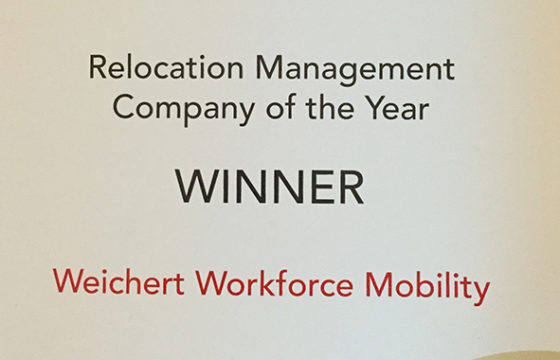
The Challenges Facing Expatriates Returning to India
A lot of attention is given to expats being sent on assignment to another country, as companies understand that the faster they assimilate, the more productive they’ll be in their new roles.

A lot of attention is given to expats being sent on assignment to another country, as companies understand that the faster they assimilate, the more productive they’ll be in their new roles.

Our company is looking to update our COLA program but not sure where to start. Any suggestions?

Our eighth annual Workforce Mobility Survey examines how approximately 170 North American companies manage their mobile talent.

Last week, we presented a webinar on Intra-Country Mobility Trends, which focused on domestically mobile workforces outside the US, UK and Canada.

We are ecstatic to announce that Weichert Workforce Mobility was named Relocation Management Company of the Year at the 2015 EMMA Awards.

Our ninth annual Workforce Mobility Survey examines how approximately 170 North American companies manage their mobile talent.

Domestic mobility in countries outside North America and the UK can be challenging for even the most globally-minded multinational companies.

Among the forces impacting the deployment of mobile talent, two have emerged as the most prominent. One, not surprisingly, is cost control, that unrelenting pressure to harness spend that shadows every corporate move.

Amidst tougher competition for the best and brightest employees, 60 percent of companies say that relocation policy benefits are critical to recruiting talent.

If you’re sending employees on temporary domestic assignments, it’s a good idea to have a policy for those moves.

Welcome to my quarterly round-up of US housing data

The Consumer Financial Protection Bureau (CFPB) is implementing the new TILA-RESPA Integration Disclosure Rule (TRID) effective October 1, 2015.

Under Canadian tax rules, non‐resident companies who send their employees to Canada are required to comply with a substantial administrative burden. This applies even if the employee is in Canada for a relatively short period of time.

One of the questions I help companies resolve with greater frequency these days concerns intra-regional moves and the advantages (and disadvantages) they offer over traditional expatriate moves.

Today, business success depends on how quickly and easily you can deploy your most highly-valued talent to seize new opportunities. But what are the best practices for building an agile mobile workforce?

Oil companies continue to be challenged by increased competition, fluctuating supply and demand, and the increasing costs of managing a mobile workforce that must be ready to deploy when needed to difficult areas around the globe.

In 2020, millennials–those born between 1980 and 2000–will represent 50% of the workforce. In 2025, they’ll represent a staggering 75%.

We’re never ones to brag. In fact, we prefer to use this space to discuss our latest research findings or some other piece of info that will make managing your relocation program easier.

Remaining compliant with international tax regulations and satisfying the global tax obligations of their mobile workforces pose significant challenges for most multinational corporations, and the stakes for non-compliance are getting higher.

Our 2014 Workforce Mobility Survey polled approximately 200 North American companies on the ways they deploy key talent.

Our 2014 Workforce Mobility Survey polled approximately 200 North American companies on the ways they deploy key talent.

Our 2014 Workforce Mobility Survey polled approximately 200 North American companies on the ways they deploy key talent.

We were proud to have our VP of Consulting, Ellie Sullivan, quoted in a couple of relocation-themed articles this past week, in two different countries.

As companies strive for greater flexibility to respond to the increasing speed of business and broader range of opportunities, temporary domestic assignments have grown in popularity.